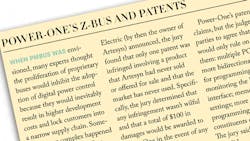When PMBus was envisioned, many experts thought the proliferation of proprietary buses would inhibit the adoption of digital power control because they would inevitably result in higher development costs and lock customers into a narrow supply chain. Something more complex happened in 2005, when Power-One brought suit against Artesyn’s customers, claiming patent infringement.
The suit effectively warned all the semiconductor companies with PMBus products to withdraw those products from the marketplace. On November 15, 2007, a Texas jury found that both of the asserted patents were valid and that the Artesyn Technologies product infringed on Power-One’s U.S. Patent No. 7,000,125.
In one sense, the decision was welcome because it removed many uncertainties and opened the door to licensing negotiations. As Emerson Electric (by then the owner of Artesyn) announced, the jury found that only one patent was infringed involving a product that Artesyn had never sold or offered for sale and that the market has never used. Specifically, the jury determined that any infringement wasn’t wilful and that a total of $100 in damages would be awarded to Power-One in the event of any court judgement.
Explicitly, what was in the Power-One patents that the jury upheld? There are two patents, and the jury found all their claims valid. One was U.S. Patent 6,936,999 for the Z-Bus Digital Power Module, the controller. The other was 7,000,125, “Method and system for controlling and monitoring an array of point-of-load regulators.” That’s the one Power-One said Artesyn had violated in the product that Artesyn had never sold or offered for sale and that the market had never used.
Power-One’s patent made 31 claims, but the judge got the parties to agree that the jury would only rule on several of them: multiple POLs; one or more bidirectional serial buses for programming, control, and monitoring the POLs; a user interface; memory with default settings; more details about programming; and the exact constituents of such a POL. The jury said that they were all valid.
August 2009 saw the first public announcement of a licensing agreement—with the Irish semiconductor company Powervation. In September 2009, CUI Inc. announced an agreement that involved Powervation’s POLs. There may have been an earlier, unannounced agreement between Power-One and Texas Instruments. Today, licensing agreements between Power-One and makers of PMBus products are routine.
About the Author

Don Tuite
Don Tuite (retired) writes about Analog and Power issues for Electronic Design’s magazine and website. He has a BSEE and an M.S in Technical Communication, and has worked for companies in aerospace, broadcasting, test equipment, semiconductors, publishing, and media relations, focusing on developing insights that link technology, business, and communications. Don is also a ham radio operator (NR7X), private pilot, and motorcycle rider, and he’s not half bad on the 5-string banjo.
